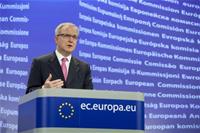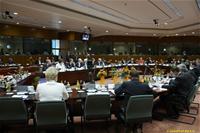The stick and the carrot of Brussels
Ralitsa Kovacheva, July 2, 2010
 Since the European Council (June 17, 2010) I cannot stop wondering how strong budgetary control and macroeconomic surveillance, agreed by the Council, will be put into practice. Will the former (budgetary control) be realised and how, since we have a clear refusal from Great Britain to show its budget firstly to Brussels, and also in the Council’s conclusions there was no single word about annual budgets just about medium-term programmes. And the practical realization of the latter (macroeconomic surveillance) will help guessing whether the eurozone will separate into an independent economic governance.
Since the European Council (June 17, 2010) I cannot stop wondering how strong budgetary control and macroeconomic surveillance, agreed by the Council, will be put into practice. Will the former (budgetary control) be realised and how, since we have a clear refusal from Great Britain to show its budget firstly to Brussels, and also in the Council’s conclusions there was no single word about annual budgets just about medium-term programmes. And the practical realization of the latter (macroeconomic surveillance) will help guessing whether the eurozone will separate into an independent economic governance.
The answer to both questions is Yes
Responding to the request of the Council, the European Commission presented a  proposal about the toolbox, which would help the ideas for enhanced economic governance in the union be put into practice. As EU Commissioner for Economic and Monetary Affairs Olli Rehn said, these practical and technical proposals have great political meaning. And as it will become clearer shortly, he is absolutely right.
proposal about the toolbox, which would help the ideas for enhanced economic governance in the union be put into practice. As EU Commissioner for Economic and Monetary Affairs Olli Rehn said, these practical and technical proposals have great political meaning. And as it will become clearer shortly, he is absolutely right.
The milestone of the proposal is the so called "European semester" - six-month cycle of budget surveillance and possible recommendations before national parliaments approve the budgets in the autumn. Given all negative comments and disagreements expressed in recent months, the Commission has dressed the new order up in almost masterly formulations. The cycle begins in January with the "Annual Growth Survey" (AGS) made by the Commission and a notice – presented to the European Parliament. MEPs have clearly shown that they would not allow being excluded from the most important decisions of the Union, formerly prerogative of the Commission and the Council. As a result, the Parliament has received an entire sentence in the text of the proposal.
Then, in April, Member States should provide Brussels with their Convergence Programmes and National Reforms Programmes to be assessed by the Commission. The institution has explicitly noted that “Member States are not expected to present full-fledged budgets to the EU before they present them to their national Parliament.” They are asked to submit "only" a certain set of information which is: an update of fiscal plans for the current year; a macroeconomic scenario underpinning budgetary projections; concrete indications on plans for the next budget; a description of envisaged policies; and medium-term budgetary projections for main government variables.
The governments will receive detailed instructions on how to prepare for the semester in July, and in September bilateral talks with each of the 27 countries will be held, given their national characteristics.Ultimately, Brussels will not benefit if someone would "fail" the first semester which will begin next spring.
Once the Commission had assessed the budgetary policy of each country in early July, the Council could make recommendations for individual countries. Now note the deadlines. When the semester was initially discussed, it was planned that it should start in the beginning of the year. Then Britain said: no big deal, but we do our budget in spring and there is no way for us to show it to you in the beginning of the year. Now we are talking about April, and the final evaluations and recommendations of the Council are set for early July. This means - no room for exceptions. The British desire for exceptionality is spared also stylistically because in the proposal the word “budget” has not been mentioned (it will indeed be seen firstly by the House of Lords), but it refers rather to programmes and “information to be transferred should allow for meaningful discussions on fiscal policy.”
In an attempt to soothe potential criticism, Olli Rehn stressed again that "“this (the budget review) is not interference in the member states parliamentary sovereignty instead it is about making sure that the national budgets are consistent with the European commitments of the member states and that the national budgets will not put at risk the finance and macroeconomic stability in Europe.”
 To ensure that it will obtain the needed information, the Commission has proposed new requirements for national budgetary frameworks (which will be outlined in a separate precise and detailed proposal in September), the quality of national statistics data and forecasting methodologies, compatibility of national budgetary targets with the obligations under the Treaty and a switch from annual to multi-annual budgetary planning.
To ensure that it will obtain the needed information, the Commission has proposed new requirements for national budgetary frameworks (which will be outlined in a separate precise and detailed proposal in September), the quality of national statistics data and forecasting methodologies, compatibility of national budgetary targets with the obligations under the Treaty and a switch from annual to multi-annual budgetary planning.
Since we've started with the British example, as the most striking resistance to budgetary surveillance, it will soon become clear what Britain has benefited from the deal (because you hardly believe that David Cameron will now remain surprised, do you?!). To get there, however, we have to see how the other "pillar" of intensified control (kindly called economic governance) - macroeconomic surveillance - will be realized. This is the well known “scoreboard” about which euinside repeatedly wrote, that will serve as an early warning for emerging imbalances.
The Commission will develop both the specific indicators (for instance current  account balances, real estate prices, public and private debt) and alert thresholds, the crossing of which will put a country into an "excessive imbalances position". Here comes the first red light: “A differentiated scoreboard for euro-area and non-euro area Member States appears warranted”, has noted the Commission, “due to differences in exchange rate regimes and in key economic characteristics”.
account balances, real estate prices, public and private debt) and alert thresholds, the crossing of which will put a country into an "excessive imbalances position". Here comes the first red light: “A differentiated scoreboard for euro-area and non-euro area Member States appears warranted”, has noted the Commission, “due to differences in exchange rate regimes and in key economic characteristics”.
In case a Member State is placed in an "excessive imbalances position" , the Commission will make recommendations. For the euro area countries, however, a separate enforcement mechanism will be designed - the second red light. This proposal does not specify though how would the implementation of recommendations be ensured and what the different procedure for the euro area would be. The Commission will submit another detailed proposal on this by the end of September.
An important element of the enhanced control is an increased focus on government debts in terms of the rate of their reduction. A special indicator will be designed on, showing that countries with debt over 60% of GDP (the limit, set in the Stability and Growth Pact) may be subject to excessive deficit procedure unless they comply with this indicator at a satisfactory pace of debt reduction. This proposal was made by the Task-force of EU President Herman van Rompuy, with an explicit clarification that there will be no new procedure for excessive debt but rather the existing excessive deficit procedure will be used .
However, this will obviously not happen automatically as the current Excessive Deficit Procedure, but after a thorough analysis based on several factors such as maturity structure and currency denomination of debt; accumulated reserves and other government assets; implicit liabilities, notably related to ageing; the level and change in private debt, etc.
In the framework of macroeconomic surveillance, structural reforms will be closely monitored, because it is now painfully clear how necessary they are to ensure not just financial stability, but especially sustainable growth.
And in order all this to happen (also a good lesson from the past 10 years) recommendations are not enough. Sanctions are needed. Moreover, as it has been noted repeatedly by all institutions in Brussels, more flexible and more timely sanctions than the excessive deficit procedure. In the current proposal, the Commission has divided the sanctions in two groups - preventive and corrective, focusing on the first ones in the spirit of the proposal - early detection of problems and timely response by Member States. After the words of Commissioner Rehn, prevention is better than correction, but a reliable mechanism is needed for the implementation of the Stability Pact.
Now comes the time to see why London had ultimately proved willing to share its budget with Brussels, albeit in crude form. Because the most concrete sanctions “in cash” are provided for the members of the euro area. If sufficient progress is not achieved in fiscal consolidation “in good economic times” and in case of persistent violations, “an interest-bearing deposit would be imposed by the Council until the violation has been corrected.”
Another type of preventive sanctions for all member states is the establishment of “ex-ante conditionality linking disbursement of cohesion policy support to structural and institutional reforms”. Where preventive sanctions would not work, i.e. an excessive deficit procedure had already been started, the corrective sanctions will enter into force. They are related to postponement and if needed - suspension of payments under the cohesion and agricultural policy and fisheries.
An important clarification is that while countries may be deprived of these funds, they must fulfill their obligations to final beneficiaries with funds from the national budget, but then the money will not be refunded. At the same time it is provided for countries with sound public finances to get incentives from the savings violators had made. It is also important that EU Commissioner Olli Rehn "skipped" answering a journalist's question whether the sanctions would be triggered automatically.
 As already mentioned, the details and clarifications on these issues are yet to be made. It is also expected the European Council in October to be "bloody", because this is where new EU economic governance will receive green light in order to be enforced in the beginning of next year. To summarize, no matter the twisted phrases and the courtesy to sensitive "national sovereignty", the message is so clear that it is strange these things need to be reminded, given the Union is now 60 years old. But obviously it should.
As already mentioned, the details and clarifications on these issues are yet to be made. It is also expected the European Council in October to be "bloody", because this is where new EU economic governance will receive green light in order to be enforced in the beginning of next year. To summarize, no matter the twisted phrases and the courtesy to sensitive "national sovereignty", the message is so clear that it is strange these things need to be reminded, given the Union is now 60 years old. But obviously it should.
The European Union is not a hobby club
EU membership means not only benefits but also responsibilities. The only chance of the "weak" countries is not to rely on the “strong” ones, but to take  advantage of their membership to become stronger. The first signs of "separation" of the euro area from the "rest" are already a fact and this is worrying.
advantage of their membership to become stronger. The first signs of "separation" of the euro area from the "rest" are already a fact and this is worrying.
The EU is a union not just (or even less, as it turns out) of economies, but of shared values. And neither control nor sanctions can replace their absence.
Until recently this has been painfully felt in Sofia, but not in Brussels. Apparently they are already aware. The stick and the carrot are a temporary solution. However, no time is left.